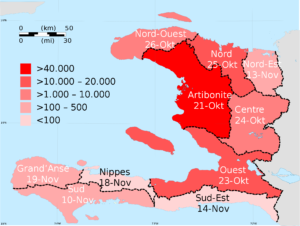UN Considers 400 Million Plan to Address Cholera Outbreak in Haiti
The United Nations announced on October 24 that it plans to raise $400 million from member states to address the cholera outbreak in Haiti that has sickened nearly 800,000 Haitians and killed more than 9,300 since 2010. The announcement comes after the international organization accepted “moral responsibility” for the outbreak that has been linked to UN Nepali peacekeepers stationed in the country in the wake of the 2010 earthquake. According to the New York Times, U.N. workers disposed infected waste into a river, which ultimately resulted in the first cholera outbreak in Haiti in more than 100 years.
Now, in response to the epidemic, the United Nations is drafting a two-pronged plan to address the situation. "The first track involves intensifying our efforts to treat and eliminate cholera as well as to improve long-term access to clean water and sanitation," said Jan Eliasson, UN Deputy Secretary-General, in an interview with NPR. The second track provides roughly $200 million in “material assistance” to those who were affected by the outbreak, including Haitians who got sick or lost a family member to the disease.

“We want to do this because we think it’s the right thing to do for the Haitian people, but frankly speaking, it’s the right thing to do for the United Nations,” Eliasson said.
Despite these efforts, the UN continues to face criticism, specifically accusations that it is merely avoiding legal culpability for the outbreak. Philip Alston, one of the United Nations’ independent experts on human rights issues, condemned the plan as insufficient.
“It will be a travesty of justice if, having moved so far in such a short time, the United Nations finds itself at the last moment unable to accept the principle of accountability… and if it is similarly unable to embrace the principle of respect for the rights of victims to compensation as opposed to charitable payments,” he said.
The future of the plan remains unclear. The proposal will first need to be presented to the UN General Assembly, and some member states may be unwilling to pay millions of dollars in direct compensation to victims.
“Most people recognize this is something the United Nations has to deal with. It’s an unfinished story,” said Dr. Nabarro, a British physician appointed by Secretary General Ban Ki-moon to lead the anti-cholera effort.
